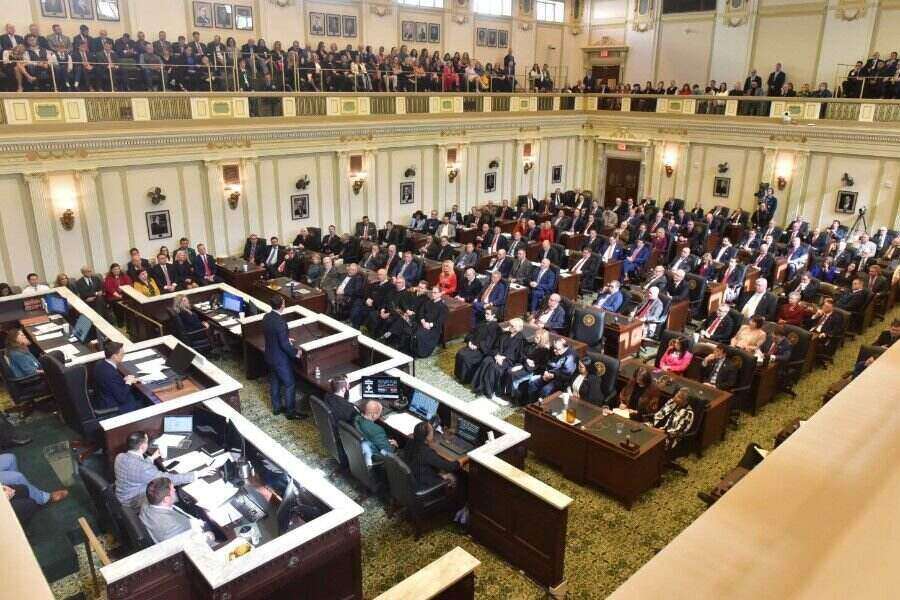Oklahoma lawmakers have followed in the footsteps of Texas by approving a law that prohibits illegal immigrants from the state.
Governor Kevin Stitt is expected to sign HB 4156, which passed the State Senate with a vote of 39 to 8 on April 23rd.
The legislation garnered strong support from the GOP-dominated legislature, while Democrats strongly opposed it.
On April 18th, the Oklahoma House of Representatives approved the bill, which establishes the offense of “impermissible occupation,” with a vote of 77 to 20.
Oklahoma’s House Speaker Charles McCall (R-District 22) and Senate Pro Tem Greg Treat (R-District 47) co-authored the new bill. A total of 26 sponsors from both chambers of the state legislature supported the bill.
According to the bill, “A person commits an impermissible occupation if the person is an alien and willfully and without permission enters and remains in the State of Oklahoma without having first obtained legal authorization to enter the United States.”
HB 4156 asserts that illegal immigrants are overtaxing Oklahoma’s law enforcement and social services, among other concerns. The bill highlights unlawful marijuana farms as contributing to the issue by hiring illegal workers and providing a gateway for drug cartels into Oklahoma.
For a first offense, individuals face a misdemeanor charge, which could result in a maximum sentence of one year in a county jail, a fine of up to $500, or both. Repeat offenses are considered felonies, carrying a potential penalty of up to two years in prison, a fine of up to $1,000, or both.
Illegal immigrants who have been prohibited from entering the country or departed the U.S. while under a removal order and subsequently entered Oklahoma will be charged with a felony offense. This charge could lead to a maximum penalty of two years in prison, a fine of up to $1,000, or both.
In all instances, those found guilty must leave Oklahoma within 72 hours of being released from custody.
The legislation mandates law enforcement to gather fingerprints, photographs, and biometric information, which will then be verified against Oklahoma State Bureau of Investigation databases.
“The failure of the federal government to address this issue . . . has turned every state into a border state,” Mr. McCall said in a statement.
“Those who want to work through the process of coming to our country legally are more than welcome to come to Oklahoma; we would love to have them here. We will not reward [illegal immigration] in Oklahoma, and we will protect our state borders.”
In a statement issued on April 23rd, Mr. Treat agreed with Mr. McCall, stating that Oklahoma was left with no alternative due to the federal government’s lack of action.
“The southern border crisis has created a scourge of illegal activities,” Mr. Treat wrote in his statement. “The Oklahoma legislature is taking the necessary action to protect our citizens.”
Oklahoma Attorney General Mark Drummond issued a press release praising the bill upon its passage by the state Senate.
“The Biden Administration has been utterly derelict in its duty to enforce federal law,” Mr. Dummond said. “If the president won’t secure the nation’s border, then our state must step in to protect Oklahomans.”
“I appreciate President Pro Tempore Treat and Speaker McCall for their swift work on this bill, and I encourage Gov. Stitt to sign it into law.”
Senator Michael Brooks (D-Oklahoma City) spoke against the new bill. While acknowledging the need to address illegal immigration, he argued that the bill conveys a misguided message and poses a risk of victimizing people who are seeking a better life in the United States.
He attempted to propose a bill aimed at providing identification documents and driver’s licenses for illegal immigrants but encountered limited backing for the proposal.
“The bill has been fast-tracked, bypassing the opportunity for vetting and public input at the committee level, and could leave tens of thousands of immigrants within our state at risk for unfair profiling and persecution, regardless of their status,” Mr. Brooks’ statement reads.
The Oklahoma legislation bears a striking resemblance to Texas SB4, which Republican Governor Greg Abbott signed into law back in 2023.
Similar to the Texas law, this legislation empowers state and local law enforcement to uphold immigration regulations while prohibiting municipalities from enforcing any local ordinances that contradict state mandates.
Legal action has been taken by the Biden Administration and civil rights organizations to halt the implementation of the Texas law.
The matter is currently being reviewed by the 5th U.S. Circuit Court of Appeals, which recently heard arguments earlier this month.
Share your thoughts by scrolling down to leave a comment.













